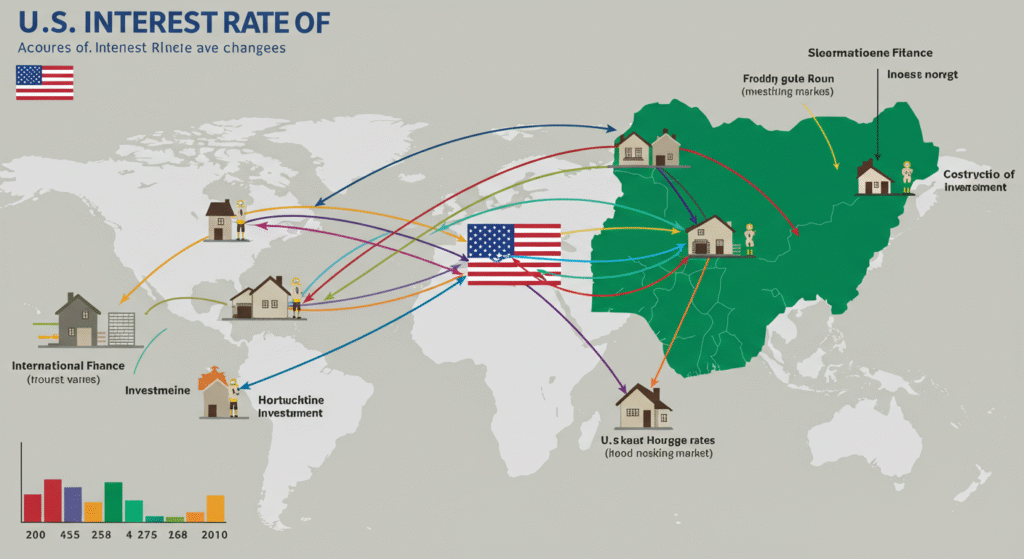How High U.S. Mortgage Rates Impact Nigeria’s Housing Market
When the U.S. sneezes, the world catches a cold—and right now, its housing market has the sniffles. This month on CNBC’s Squawk Box, Lawrence Yun, Chief Economist of the U.S. National Association of Realtors (NAR), delivered a simple but powerful warning about high U.S. mortgage rates: He says, “Mortgage rates continue to hinder housing affordability.”
Furthermore, he called mortgage rates the housing market’s “magic bullet”—the single factor that could unlock recovery. While his remarks focused on the United States, the truth is these rate changes can send ripples around the globe—right into Nigeria’s property market.

In this article, we’ll break down:
- Who Lawrence Yun is (and why he’s worth listening to)
- What he said this month about rates
- How U.S. mortgage rates connect to Nigeria’s housing struggles
- What buyers, developers, and policymakers can do next
Who Is Lawrence Yun—and Why Should You Listen to Him?
Lawrence Yun isn’t just another market commentator. As Chief Economist and Senior VP of Research at NAR—the largest real estate group in the U.S.—his insights influence government policies, developer plans, and investor strategies worldwide.
When Yun says, “Mortgage rates are the biggest barrier to affordability,” he’s not just making conversation. He’s summarizing decades of housing data, lending behavior, and global capital trends.
What Yun Said in August 2025
Appearing on CNBC, Yun made three key points:
- Mortgage rates will likely average 6.4% in late 2025 and 6.1% in 2026.
- Home prices in the U.S. could rise by 3% in 2025 and 4% in 2026.
- The housing market will only recover when borrowing costs drop.
In simple terms, even if more houses are built, if loans stay expensive, many people can’t simply buy.
Why U.S. Mortgage Rates Matter in Nigeria
You might wonder, why should a rate in the U.S. affect homes in Lagos or Abuja? Here’s how:
- Global Money Movement—When U.S. rates go up, global investors often move their money into safe, dollar-based investments. That means less foreign capital flows into places like Nigeria’s housing market.
- Expensive Dollar Loans—Many Nigerian developers borrow in U.S. dollars. Higher U.S. rates mean those loans cost more, making projects slower and homes more expensive.
- Diaspora Spending Power—Nigerians living abroad often buy property back home. But if their mortgages in the U.S., UK, or Canada go up, they have less cash to invest in Nigeria.
- Building Costs—A strong U.S. dollar makes imported materials—cement, steel, and tiles—more expensive. Developers pass that cost to buyers.
- Nigeria’s Own High Rates—The Central Bank of Nigeria’s key interest rate is currently 27.5%. That pushes bank mortgage rates above 20%, making loans almost impossible for the average person to afford.
Nigeria’s Housing Finance in 2025: A Hard Reality
Right now, mortgages are rare. Most homes are bought for cash. Loans are too costly. Borrowing from banks is unaffordable for most families. Experts call for reform. Ideas include mortgage-backed securities, longer repayment terms, and better credit data to help banks reduce interest rates.
In June, BusinessDay Nigeria called this situation a “mortgage mirage”—a dream that remains out of reach for millions.
Why These High U.S. Mortgage Rates Matter for Everyone
If you live in Nigeria, rising rates mean home prices and rents may increase. And if you live abroad, your overseas mortgage can affect your ability to invest at home.
While being an investor, you may find better returns in African housing if U.S. markets cool. Being a developer, understanding rate cycles helps you choose the right time to launch projects.
Climate Risk Real Estate Values in the U.S.
What Can Be Done Now?
Nigerian Buyers
Watch both the U.S. and Nigerian interest rates before committing to buy.
Look for rent-to-own or developer-financed homes as alternatives to bank loans.
Abuja Embassy Real Estate Faces Major Crisis Over Unpaid Ground Rent
Developers & Agents
Offer flexible payment plans that can adjust for currency shifts.
Market properties directly to diaspora buyers when U.S. rates dip.
Policymakers
Create mortgage-backed securities to spread lending risks. Extend repayment terms so monthly payments are affordable. Build stronger credit systems so banks can lend with less risk.
Diaspora Investors
Track announcements from the U.S. Federal Reserve. Take advantage of favorable exchange rates to invest in Nigerian property.
Yun’s “magic bullet” comment is a reminder: Mortgage rates are global indicators. What happens in Washington or New York can directly affect real estate opportunities in Abuja, Port Harcourt, or Enugu. In today’s interconnected financial system, no housing market is truly local.
Conclusion
Lawrence Yun’s August 2025 warning: Rates are the key barrier to housing recovery. For Nigeria, the challenge is even bigger—domestic rates are sky-high while global factors make building and buying more costly.
Action is possible—but it requires buyers, developers, and policymakers to watch global trends and plan.
